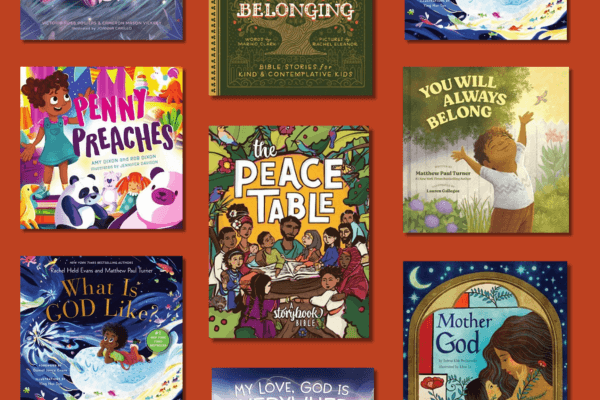Daneen Akers faced a dilemma: After moving away from fundamentalist Christianity, what books about God could she read to her kids? She went through the boxes in her parents’ basement, full of the books she’d grown up with — books that used exclusively male pronouns for God and talked about Jesus’ blood satisfying a debt owed for humanity’s sins.
“The faith stories I had inherited, a lot of us had inherited, were just not sufficient. I wanted something expansive,” Akers said.
Akers was adamantly opposed to sharing with her daughters any faith that presented God as exclusively male or relied on violent atonement theories.
“Part of my faith shift was recognizing how excluded I felt in a female body from the imago dei,” she said.
So, Akers did what a growing number of post-evangelical parents are doing as they seek to give their children a different theology or view of God than what’s readily available on bookstore shelves: She wrote a children’s book.
Then she wrote another.
Akers’s two books, Holy Troublemakers & Unconventional Saints and Dear Mama God, are part of a growing body of children’s literature dedicated to inclusivity — of gender, sexuality, race, biblical hermeneutics, and belief. In Holy Troublemakers, Akers chronicles the lives of past and present people of faith whose pursuit of God led them to challenge their churches and governments. The book highlights Rev. Wilda C. Gafney, Bayard Rustin, and Maryam Molkara, among others.
In Dear Mama God, Akers draws on Gafney and other womanist teachers to teach how scripture refers to God in feminine terms. Gafney’s work highlights that the Hebrew Bible is “full of feminine God-language.” Akers wrote Dear Mama God to make the truth of God’s gender expansiveness accessible to younger children. The title for Dear Mama God, Akers explained, came from her toddler’s adaptation of “Mother God,” a term Akers deliberately used with her daughters. The toddler began to pray regularly to “mama God,” and the endearment stuck.
Akers said the challenge of writing a children’s book — with their limited word counts and simple vocabulary — helped her grow in new aspects of her faith.
A more telling challenge — one many authors told Sojourners they found — was advocating for their values amid the publishing industry’s incentive toward sales. Akers, for example, wanted the illustrations in Holy Troublemakers to match the culture of the people profiled — for instance she wanted Potawatomi writer Kaitlin Curtice’s portrait to be illustrated by a Potawatomi artist.
“That kind of thoughtfulness doesn’t come easily, and the mainstream publishing industry just is not interested,” said Akers, who published through Watchfire Media, originally a project she started with her partner to produce documentary films. They reorganized Watchfire as a nonprofit to include the publishing and production of “beautiful, spiritually-expansive children's books and films.” In an email, Akers told Sojourners that the success of Holy Troublemakers, now in its third printing, led to more mainstream offers, but, “so far, being a boutique publisher of high-quality books feels better as we can maintain a really high standard and ensure ethical printing practices through the worker-owned co-op press in Canada we’ve partnered with.”
Cameron Mason Vickrey and Victoria Robb Powers published their book, My Love, God is Everywhere, with Thomas Nelson, a large, well-established Christian publisher that is now a subsidiary of “Big Five” publisher HarperCollins. Their book doesn’t aim to challenge traditional or conservative ideas directly but reflects the authors’ desire to see a change in theological emphasis. The book takes a broad view of where the child can find God, not on specific doctrinal propositions.
Even so, Vickrey said, they ran into an issue with their publishers during the editing process. The original version asked, "Is God there in the dog?" Vickrey said. The response on the following page was: "God is in the dog, who loves us all day long..." This led to a conversation about the difference between pantheism (the idea that the sum of everything is God) and panentheism (the idea that God is present in all things) and the teams’ respective comfort levels with these ideas. The final version included the line, “God’s warmth is in the dog.”
“What we wrote to be somewhat panentheistic sounded too much to our publishers like we were suggesting that the dog is God,” Vickrey said. “... It is a great example of how theology lives in the prepositions. Changing the smallest words can have the biggest implications.”
Each of the books and story Bibles on this list, compiled by Sojourners, aim to communicate faith in new ways for a young audience. The faith these authors — who are almost all parents themselves — communicate might be different from books they grew up with in large or small ways, but it carries on at least one critical tradition: passing on faith through story.
Dear Mama God by Daneen Akers
Based in the biblical scholarship of Gafney, the book elevates feminine images of God. Watchfire Media, 2023
The Book of Belonging by Mariko Clark
A children’s Bible curated and illustrated for “diverse stories with a focus on wonder, contemplation, and identity.” Convergent Books, coming September 2024
Penny Preaches by Amy and Rob Dixon
This book invites young girls to consider whether they might be called to be teaching pastors. IVP Kids, coming summer 2024
The Peace Table: A Storybook Bible by Chrissie Muecke, Jasmin Pittman Morrell, and Teresa Kim Pecinovsky
A storybook Bible with emphasis on belonging, inclusion, creation care, and connection. Herald Press, 2023
Mother God by Teresa Kim Pecinovsky
A story that lyrically celebrates feminine images of God. Beaming Books, 2022
My Love, God Is Everywhere by Victoria Robb Powers and Cameron Vickrey
This book encourages kids to embrace God as a caring, welcoming presence all around them. Tommy Nelson, 2023
You Will Always Belong by Matthew Paul Turner
Like Turner’s other books, it promotes an inclusive vision of Christianity. Convergent, 2024
What Is God Like? by Rachel Held Evans and Matthew Paul Turner
The book, published after Evans’ death, depicts God as “wide, kind, playful, present,” Sojourners’ Jenna Barnett wrote. “She seems to give very good hugs.” Crown Publishing Group, 2021
All books featured on this list were independently selected by Sojourners’ editors and writers. Sojourners has partnered with Bookshop.org; when you order books through the links on sojo.net, Sojourners earns a small commission and Bookshop.org sends a matching amount to independent bookstores.
Got something to say about what you're reading? We value your feedback!







